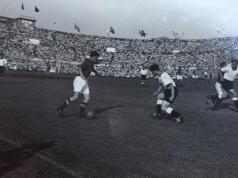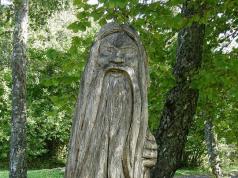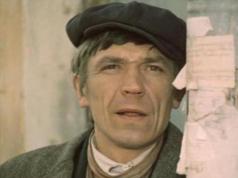Chanson performers in their songs often use words whose meaning is not clear to everyone. The word "zhigan" is used quite often in the works of this genre, as well as in the speech of representatives of certain segments of the population. For people who do not have prison experience, it is associated mainly with the underworld. Not knowing who a zhigan is, law-abiding citizens also resort to using this word.
Today there are several versions of the origin of this term. In this article, we will consider the meaning of this concept, the history of its origin, thereby answering the question: “Who is a Zhigan?”
Interpretation options
There are different opinions about the meaning of this term. Therefore, it is impossible to give an unambiguous answer to the question: “Who is a Zhigan?” According to one version, this was the name of stokers or people stained with soot. This category included all those whose activities were somehow connected with fire.
According to the second version, in tsarist Russia, the poorest convicts and inmates were called "zhigans". This name was also applied to free people who lost at cards. Today, this word is applicable to those who seek to live "according to the rules."

Who are the Zhigans? The history of the emergence of a new caste
In the post-revolutionary years, a new caste of convicts formed from political prisoners and former White Guards in labor camps, from which the most successful and desperate inmates were later called "Zhigans". Unlike the bulk of those convicted of criminal offenses, the White Guards had their own ideology, were literate, more organized and sought to take a leading position in the criminal world. According to historians, this category represented a very serious danger for the new government, because it did not want to accept the communist ideology. This “suit” was headed by its leader, who was called “zhigan”. Thus, with the advent of Soviet power, the meaning of the word "zhigan" in the criminal world was enriched with a new meaning: they began to be called especially desperate and experienced people who embarked on a criminal path. Synonyms appeared for him: “gigs”, “hot”, “lighters”. So called all those who are able to "burn", that is, to inflict painful blows.
Some researchers involved in the history of Russian crime believe that the word form "thief in law" appeared after the concept of "zhigan". It was in the 1920s that the prisoners were divided into the old thieves' formation (urki) and the new one - zhigans.
Formation
In the camps, Zhigans quickly adapted to the customs of the underworld. Since the new wave consisted predominantly of the military, a rigid hierarchical gradation was built in their interpersonal relations. In freedom, they led gangs of tramps and homeless people, engaging in robbery and theft. Feeling hatred for the Soviet regime, which deprived them of their former benefits, they did not stop even before the murder. Unlike the lesson, the representatives of the new formation carefully planned their crimes and acted very boldly. A high level of organization, severe discipline and particular cruelty have become characteristic features of the Zhigans' criminal activity.
Rules of behavior
In places of deprivation of liberty, they developed the following rules, which were later followed by thieves in law:
- Do not work for the state and do not participate in public events.
- Don't start a family.
- Do not use government-issued weapons to defend the country.
- Do not cooperate with state structures either as a witness or as a victim.
- Regularly contribute money to the general treasury.
- Live according to the rules.
Confrontation
According to the researchers, once in places of detention, Zhigans sought to subdue the thieves of the old formation. In turn, the NKVD decided to deal with the Whites with the help of criminal prisoners. According to some historians, it was the Chekists who contributed to the emergence of thieves in law. In bloody battles, the latter, with the support of the camp administrations, defeated the Zhigans. Later, when the problem with the White Guard officers was finally resolved, the NKVD began to crack down on the thieves themselves using similar methods. Who the Zhigans are is now forgotten. However, the set of rules and laws they created is still in effect today.
The meaning of the word "zhigan"
It has several interpretations. It's called like this:
- A desperate thief who stops at nothing. According to established thieves' concepts, a thief in law has the right to take the life of another person only while protecting his own. Some lovers of prison romance put a special meaning into the expression “nothing before anything”, which consists in the readiness and ability to overcome serious difficulties and obstacles. To call someone a zhigan means to praise for dexterity and courage. A striking example of such a dodger is the famous St. Petersburg gangster Lenka Panteleev.

- A successful thief, mostly acting alone and denying all concepts. Some researchers of the history of Russian crime explain this interpretation by the fact that, as a “suit”, Zhigans were exterminated, and only those who accepted the idea of communism survived.
- A cunning and boastful merchant or a bully who leads a broken lifestyle. In accordance with this definition, a new concept has appeared - “burning”, that is, hooligans, breaking light bulbs, clicking seeds, spitting and behaving aggressively.
- A man honest with people, but despising the state and its laws. This type is capable of any hooligan act.
- A successful swindler, a mischievous and a rogue. In this case, the words "lucky" or "lucky" were also used. The etymology of these concepts goes back to the term "fart", which means successful, lucky.
- A young man who lives "according to the rules" and aspires to become a thief in law in the future.
- An arrogant and very arrogant person.

One of the well-known examples of the use of the word "zhigan" is the famous song of Mikhail Krug "Zhigan-lemon", the hero of which is a clever, cunning and very successful representative of the criminal world.
Slick, cunning, dodger, cunning Dictionary of Russian synonyms. zhigan n., number of synonyms: 13 thief (115) dodger ... Synonym dictionary
ZHIGAN- Zhigan, Zhigan Zhigan, husband. (Region). A swindler, a swindler, a swindler. Explanatory Dictionary of Ushakov. D.N. Ushakov. 1935 1940 ... Explanatory Dictionary of Ushakov
zhiganet- [burn] (simple) ... Dictionary of the use of the letter Yo
Zhigan- a river vessel (Cherdynsky district of the Perm province), 6 61/2 sazhens long, 3 5 arshins wide and 6 7 quarters of an arshin high, with a draft of 4 5 quarters of an arshin; lifts a load of 1000 2500 pounds ... Encyclopedic Dictionary F.A. Brockhaus and I.A. Efron
Zhigan- 1. zhigan, zhigan, zhigan, zhigan, zhigan, zhigan, zhigan, zhigan, zhigan, zhigan, zhigan, zhigan 2. zhigan, zhigan, zhigan, zhigan, zhigan, zhigan, zhigan, zhigan, zhigan, zhigan, zhigan, zhiganah (Source: “Full accentuated ... ... Forms of words
Zhigan- jig an, and ... Russian spelling dictionary
Zhigan- a recidivist thief, a desperate thief ... Thieves' jargon
Zhigan- burning ... Concise Dictionary of Anagrams
Zhigan- a recidivist thief, a desperate thief, a daring "hot" criminal. Criminal jargon… Dictionary of modern vocabulary, jargon and slang
Zhigan-lemon- Studio album Mikhail Krug Release date 1994 Recorded by Soyuz, 1993 Genre Chanson Duration 45 min 31 ... Wikipedia
Books
- Zhigan, Sukhov E .. The events of 1917 broke the fate of many officers of the tsarist army. Someone died, someone went abroad. Staff captain Ivan Golenishchev-Kutuzov managed to settle down in a new life. Replaced ... Buy for 136 rubles
- Zhigan, Sukhov Evgeny. The events of 1917 broke the fate of many officers of the tsarist army. Someone died, someone went abroad. Staff captain Ivan Golenishchev-Kutuzov managed to settle down in a new life. Changed…
What does the word "zhigan" mean? and got the best answer
Answer from UncleVova[guru]
Zhigan - An experienced thief (obsolete). ZHIGAN - The leader of a criminal gang; a daring, desperate thief; living off the punks; knowing the thieves' law; fugitive criminal. (kingpin)
This is the original meaning of the word. At present, the word is almost never used in this context.
Answer from On[newbie]
Synonyms: cunning
fraer
- You suck, bitch!
Answer from Alexey Poluboyartsev[guru]
Dahl's explanatory dictionary:
Zhigan M. is a worker at a distillery and a sugar beet factory. | perm.
dry, skinny, lean person. | Zhigan, Zhiganka, rogue, rogue, climber,
a hardened rogue; in prisons there is an experienced, old, seasoned guard. | Zhigan perm.
rowing manual vessel, a kind of small barge, sails along the Kama, Kolva, Pechora.
___________________________________________________
program for computer reading texts aloud -
genealogic.narod.ru/soft/govorilka/govorilka.htm
Answer from |Rina|[guru]
zhigan - a person who combines the qualities of a cunning huckster, braggart, aggressor. As a rule, it is used in relation to proud braggarts and cunning types, bearing the features of this psychotype even in facial expression.
Accordingly, it is possible, according to the same principle, to form a verb - zhigan, which will imply actions corresponding to the image of a zhigan (spitting, drinking beer, peeling seeds, making light bulbs, beating on sockets, etc.)
Synonyms: cunning
fraer
Examples of use: - Vasya, well, you are a Zhigan.
- You suck, bitch!
- Zhiganisty fellow, this is your Vasya.
- Maybe he was at the conservatory, but this does not stop him from being a zhigan.
Answer from 3 answers[guru]
The origins of the problem arose after the well-known political events of 1917 and the civil war that followed them. A certain part of the professional military of the former Russian imperial army was left without a livelihood and was forced to look for new ways to earn money. Since the former military did not want to work with their hands, and there was not enough space in the new army for everyone, they began to replenish the criminal sphere.
The power organs of the new Soviet government began to clean up the criminal environment, and many tsarist officers ended up in places of detention. In the difficult camp and prison life, the whole previous way of life helped them. This part of the criminal world was called zhigany.
Where did thieves in law and Zhigans come from?
Modern researchers of the domestic criminal environment have proposed several mutually exclusive hypotheses for the emergence of thieves in law. One argued that the top of the NKVD assumed direct influence and leadership of the process. The phenomenon generated by the system was supposed to help the Soviet government get rid of the remnants of the influence of the former tsarist officers in prisons and camps. The version is interesting, but has not yet received actual confirmation by documents.
Another hypothesis claims that it was the former Russian military who became the founders of the thieves in law. The system had a clear hierarchical structure and was very reminiscent of military relations. Modern researchers prefer this particular hypothesis, because the thieves' code of honor is so similar to the officer's. An indirect confirmation of the correctness of the version is the fact that until 1917 such a structure did not exist in the criminal world of Russia.
Before the revolutionary events in the country, “zhigans” were called the most disadvantaged prisoners and convicts who had nothing for their souls. Soviet power changed a lot in the structure of the state and the ideology of the masses. The term "zhigan" also changed its meaning. Now they began to call so the leaders of the criminal environment, who have great authority and power.
Battle for leadership
Various specialists in the criminal environment have dealt with this topic. However, many questions remain still unknown. After the final victory of Soviet power, many homeless children, adolescents and adults appeared. To get a livelihood, they grouped to commit violent acts: robbery and theft. Leading positions in such gangs were quickly taken by Zhigans. Embittered and dissatisfied with their position, criminal authorities often participated in crimes, wanting to "annoy" the new authorities.
The law enforcement agencies also did not sit still and actively studied. In the twenties, many gang members were moved to places of deprivation of liberty, where they met with criminal authorities. The latter received tacit support from the leadership of places of deprivation of liberty, which played a decisive role in the victory of the "lesson" over the "Zhigans". The state chose the side of ordinary criminals, not ideological opponents of the authorities.
What were the former White Guards ready to destroy Soviet power
The first thieves in law in our country appeared in the twenties and thirties of the XX century. Then they often became former white officers. Reincarnating as criminal authorities, they introduced a rigid hierarchy into the thieves' world. It was they who were once called Zhigans.
There are thieves, but no words
It is now those who honor a certain thieves' code and live "according to the rules" are called thieves in law. At the time of the NEP, such a phrase did not yet exist, so that the former regular officers of the tsarist army, who embarked on the path of crime, began to be called Zhigans.
It is difficult to say why the "white degenerates" began to be called this word; before the revolution, Zhigans were called either the poorest of the convicts, or the most "reckless" of the thieves. However, after the Civil War, the criminal leaders, who brought military discipline to the criminal organizations they headed, were known precisely as Zhigans.
Among researchers of the history of Russian crime, there is another version of the appearance of Zhigans as future thieves in law: they say that their appearance was initiated by the People's Commissariat of Internal Affairs (NKVD), in order to make it easier for the Chekists to control criminals in prisons.
However, this version of criticism does not stand up - it is contradicted, in particular, by such clauses of the code of thieves in law as “do not work for the state”, do not cooperate with the authorities.” But the former white officers could well come up with such clauses of the code - they, who did not accept the new government, of course, wanted not to cooperate with it, but to harm it. As for the code of thieves, it is in essence surprisingly similar to the code of officer honor.
Zhigans vs. Urkagans
Of course, the Zhigans were not the only gang leaders; at the same time, street children and tramps were gathered into criminal groups and experienced urkagans with a long gangster past. However, there was a big difference between gangs led by experienced criminals and gangs led by Zhigans.
Firstly, Zhigans established the strictest hierarchy and iron discipline in the thieves' collectives subject to them. Secondly, the urks and zhigans were driven by different motives: the former crossed the law solely for the sake of profit, the latter slept and saw how the foundations of the new power, the one that turned their social position into nothing, were being undermined. And thirdly, law enforcement agencies treated Urkagans and Zhigans very differently.

So, in 1926, article of the Criminal Code No. 59 came into force: "Especially dangerous crimes against the order of government for the USSR." Organized crimes were understood as “particularly dangerous for order”. So, a criminal who climbed into someone else's apartment could get off with a year of camps, and for an organized robbery, banditry was "sewn" and put up against the wall. As a rule, it was the Zhigans who tried to shake the order of administration.
By the end of the 1920s, the struggle for supremacy in the underworld migrated partly to places of deprivation of liberty.
Finish off the unfinished
The camp and prison authorities in the conflict between the Urkagans and the Zhigans were always on the side of the "class relatives" lesson. Those criminal authorities who set themselves the goal of undermining the foundations of the state by all available means had to be defeated; in places of deprivation of liberty, they obviously found themselves in worse conditions than unprincipled bandits.
Zhigans, however, were not going to give up their positions. It is known, for example, that, getting into the notorious SLON - the Solovetsky Special Purpose Camp, they, holding on to each other, tried to take the most "warm" places, and the representatives of the "thieves' mob" were treated, to put it mildly, unkindly, and even with cruelty. .

Nevertheless, the struggle for supremacy in the underworld that broke out in the late 1920s and early 1930s was won by the Urkagans. Largely because the state saw fit to take the side of the lesson.







